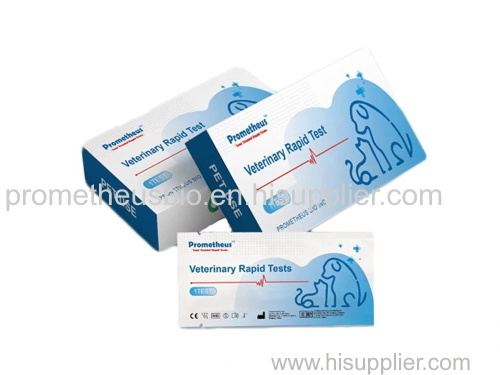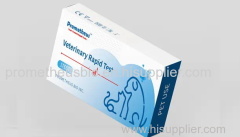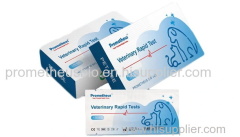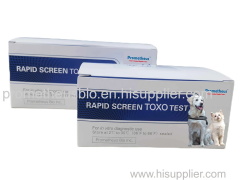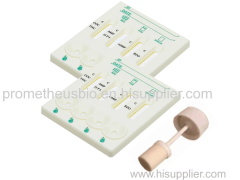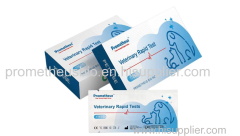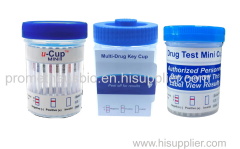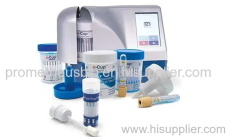
|
Prometheus Bio Inc.
|
FCoV Antigen (FCoV Ag) Test
| Place of Origin: | Zhejiang, China (Mainland) |
|
|
|
| Add to My Favorites | |
| HiSupplier Escrow |
Product Detail
Diagnostic test for Feline Coronavirus (FCoV) antigen in cat's feces
The FCoV antigen (FCoV Ag) test is a diagnostic test used to detect the presence of Feline Coronavirus (FCoV) antigen in a cat's feces. FCoV is a type of coronavirus that primarily affects cats and is associated with a range of clinical conditions, including feline infectious peritonitis (FIP).
The test is typically carried out in veterinary clinics or diagnostic laboratories. A small sample of the cat's feces is collected and analyzed. If FCoV antigens are present in the feces, a positive result indicates that the cat is infected with FCoV.
Features of FCoV Antigen (FCoV Ag) Test
Diagnostic test for Feline Coronavirus (FCoV) antigen in cat's feces
Helps diagnose feline infectious peritonitis (FIP)
Detects FCoV antigens in feces
Performed in veterinary clinics or diagnostic laboratories
Requires a small fecal sample
Positive result indicates FCoV infection, but not specifically FIP
Additional tests may be needed for FIP diagnosis
FCoV infection common in cats, not all develop FIP.
Product Details
Product Name FCoV Antigen (FCoV Ag) Test
Format/Shape Cassette
Specimen Ascites/Hydrothorax
Time to Result 5-10 minutes
Service OEM available
Shelf Life/Validity 24 months
Storage Between 2-30°C
Packing 1,10T
Manufacture Prometheus Bio Inc.
FAQs Of FCov Test kit
Q.
What is FCoV?
A.
FCoV stands for Feline Coronavirus, which is a type of coronavirus that primarily affects cats.
Q.
What is the purpose of the FCoV Ag test?
A.
The FCoV Ag test is used to detect the presence of FCoV antigens in a cat's feces in order to diagnose FCoV infection and aid in the diagnosis of FIP.
Q.
How is the FCoV Ag test performed?
A.
The test involves collecting a small sample of the cat's feces and analyzing it using colloidal gold method to detect the FCoV antigens.
Q.
Can the FCoV Ag test distinguish between FCoV and FIP?
A.
No, the FCoV Ag test detects the presence of FCoV in general but does not specifically confirm FIP. Additional tests may be required for a definitive FIP diagnosis.
Q.
Is FCoV common in cats?
A.
Yes, FCoV infection is relatively common among cats, but not all infected cats develop FIP.
Q.
Where can I get the FCoV Ag test done?
A.
The FCoV Ag test is typically performed in veterinary clinics or diagnostic laboratories. It is best to consult with your veterinarian for testing options.
Q.
Is the FCoV Ag test invasive or painful for the cat?
A.
Collecting a fecal sample for the FCoV Ag test is a non-invasive procedure and does not cause pain to the cat.
Q.
Can the FCoV Ag test be used as a preventive measure?
A.
The FCoV Ag test is primarily used for diagnostic purposes and is not routinely used as a preventive measure. Vaccination and proper hygiene practices are typically recommended for preventing FCoV infection.
Q.
Can the FCoV Ag test be performed on kittens?
A.
Yes, the FCoV Ag test can be performed on kittens. However, it is important to note that FCoV infection can be transient in kittens due to maternal antibodies, and repeat testing may be necessary for a more accurate diagnosis.
Q.
Can a cat with a negative FCoV Ag test result still have FCoV or FIP?
A.
Yes, a negative FCoV Ag test result does not completely rule out the presence of FCoV or FIP. False-negative results are possible, and additional tests or follow-up testing may be needed for a comprehensive evaluation.

